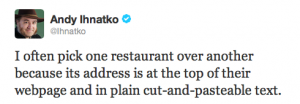http://emergelinux.tumblr.com/post/17799928317/why-i-still-choose-gentoo
Archive for July, 2013
systemd is not portable
http://people.debian.org/~stapelberg//2013/07/13/systemd-not-portable.html
Adactio: Journal—A Gov Supreme
http://adactio.com/journal/6328/
Take My Wi-Fi, Please
http://readwrite.com/2013/07/12/take-my-wi-fi-please#awesm=~obB1wAf5ers3Mr
Perspectives Project
http://perspectives-project.org/
Declaration of Content Independence
I feel like I have been sleeping for the last decade. I started my career steeped in Open Source, but then I, like most other people, got lazy and let companies like Google and Yahoo do the heavy lifting. This actually worked quite nice for a while, and it even got to a point that I was considering abandoning this site in favor of just posting on social networks. Abandoning a personally owned and managed web presence and going with a social network is not without precedence. The tech writer Mike Elgan has done this and it is working quite well for him. But then Google decided to shutdown Reader, which was probably my most used application, and that is when I started doing some rethinking on this subject.
To be fair, Google isn’t the first to disappoint me by shutting down services. Yahoo really started the trend way back with Yahoo 360. Of course then came the big Delicious sunsetting scare, another service at the time I used quite heavily.
Luckily a couple voices in the wilderness have been trying to wake us all up about this for quite some time. I have always had Jeremy Keith in the back of my head shouting “No More Sharecropping!”, of course I wasn’t listening at the time. Another persistent voice in all of this has been Tantek Çelik, who has been fostering a number of projects and events to evangelize this idea such as Micro formats and, most importantly to me, IndieWebCamp.
The IndieWebCamp site is where I started to get things back on track. Go through the resources in the nav and explore. Don’t be afraid to take baby steps to regain your platform independence and begin to own your content again. For instance I would love to get all of my content into an hAtom formatted text file (I think plain text is the most portable and maintainable format in the long run — harkening back to my Unix days – see The Unix Philosophy for more), but no really mature projects exist, and it takes time to build this stuff yourself. I am already familiar with WordPress, so I am starting there.
That doesn’t mean that I can’t implement the IndieWeb ideas. For instance I went through and made sure that my posts are marked up using hentry and h-entry micro formats.
I have followed the instruction on How to Set Up Web Sign-in On Your Own Domain so that my site become the authoritative me.
I have now started to slowly work on implementing POSSE, Publish (on your) Own Site, Syndicate Elsewhere for my content. This is a slow and tough process. Companies like Google (recent trend), Facebook, and Twitter do conspire against you from fully implementing POSSE. But, in the end, it’s better to not have to worry about growing found of a service only to have it, and often times your data, disappear with it in a few years.
The side affect of owning your owning content and controlling what you do with it, is that it become much more shareable. You don’t have to have a Facebook or Google+ account to read this post. It is freely shared and anyone can read it. I can archive it and access it 20 years from now, because it is a portable format (at least it will be when I am done).
I suppose you might call this a Declaration of Content Independence.
OS X keyboard shortcuts
http://support.apple.com/kb/ht1343
Local Is What Makes The Web On Mobile Important
First let me throw out a couple of assumptions. I am assuming that most people are at least similar to me and that the average person doesn’t drive around with more than a smartphone in their pocket. Yes I know there are exceptions, but I don’t plan on talking about edge cases. Now with those assumptions, let’s look at a scenario.
It’s a nice summer day, I decide to walk around downtown or stroll down the walking path by the river. I see shops and restaurants. I have three options on how to approach this interaction.
- Simply walk in and out of the shops and restaurants until I find something that fits my mood.
- Download and install the native app for each shop and restaurant I pass so I can explore what they offer before choosing where to go.
- Do a simple Google search to find all the restaurants or shops near me and go to the website to quickly explore.
 Before you assume you will simply do the first one, let’s look at a photo from yesterday’s San Francisco plane crash posted by David Eun to Twitter.
Before you assume you will simply do the first one, let’s look at a photo from yesterday’s San Francisco plane crash posted by David Eun to Twitter.
First, your plane just crashed, it’s on fire, black smoke is billowing out, and, from this photo, at least two people stopped, pulled out their phone and took pictures and, in the case of David Eun, posted the photo with a short statement to both Path and Twitter.
I think it is more common to check your phone first than not today. The phone has become, good or bad, the lens through which we see and interpret the world.
So, I am going to scratch number one from the list.
It’s absurd to think you could download and explore each shop or restaurant’s native apps, even if we assume they all have them, and most won’t.
That leaves number three as the most likely choice for the average person. To be honest, I normally do that same interaction, but from home prior to going anywhere so I can easily pull up a book mark or map while I am out and about, but sometimes something will catch my eye that I will want to explore.
The real question is, when I look at your site, can I find the information I am looking for or am I blocked by what looks like great fun and eye catching ornamentation in the marketing presentation, but is completely useless when I am on my phone looking for the restaurant menu or list of products in stock?
This is the great fallacy of modern web design, ornamentation over substance.
When most people look at a website they want some basic information, especially if it is a local business. What is your address? What is your phone number? What does the restaurant look like inside? What is on the menu (hint: PDF’s suck to look at on a phone)? What products are you selling? Are they in stock?
You have about 8 seconds to convey the answers to most of those questions or a person is going to move on. It turns out that the one thing we don’t lack in modern society is choice.
Whether you love or hate Apple products, you have to agree with their philosophy that design is more about saying no than it is about saying yes. I think on the web, we could all use to say no a little more often and we would all be better off.
This idea certainly carries over to a national or international brand sites, but I spend a lot more time trying to find local information than I do trying to find national and international information. Test it for yourself. Keep a log of all the web sites you visit on your smart phone during a day and see how many are local compared to international. Watch how you use the device in your life. What makes you think everyone else wants information different than what you want?
Paperless Utopian Dreams
Paper is the primary component of Kipple and as we all know, Kipple is inevitable.
People, semi-consciously, love paper. They collect it, sort it, stack it, run their fingers through it, and, in extreme cases, they hoard it. I would go so far as to postulate that there is some correlation between the senselessness of a job and the amount of paper that is required to perform it. The more paper you collect and manage, the more likely it is that you are in a job that is senseless and destined to be replaced by a cost effective robotic functionary.
This semi-conscious paper affliction conspires against anyone attempting to attain a paperless lifestyle. An article on Gigaom (A Digital Life: Trying to go paper-free? I almost pulled it off) is a great example that, despite your best effort, the world is conspiring against a paperless lifestyle.
Perhaps a paperless lifestyle is akin to a Buddhist’s quest for enlightenment, noble but likely unattainable. But just like the quest for enlightenment it’s the journey, not the destination, that we should focus on.
I will admit right now, I love dead tree books. But, despite wrestling with this demon, it doesn’t stop me from attempting to live a paperless lifestyle.
I have read David Sparks’ comprehensive book on becoming a paperless ninja. I even implement a good deal of it, but despite my effort, the world of paper hoarding, senseless job holders conspire against me. This leaves me with a continuously full basket of paper to deal with, but I accept the challenge and learn new techniques to deal with paper everyday.
I implement many of the Jamie Rubin, the Evernote Paperless Lifestyle Ambassador’s, blog tips on leveraging Evernote in a quest for a paperless Nirvana. Remember, it’s a quality of life issue.
What I have found is that the paperless journey enriches my life, despite having little hope of attaining a pure paperless utopia. We all might be better off if we refuse to use a fax machine, when email is cheaper and easier. What if we all checked the box to receive paperless statements for our billing?
Imagine how your life would be free from the bondage of paper and join the journey.


